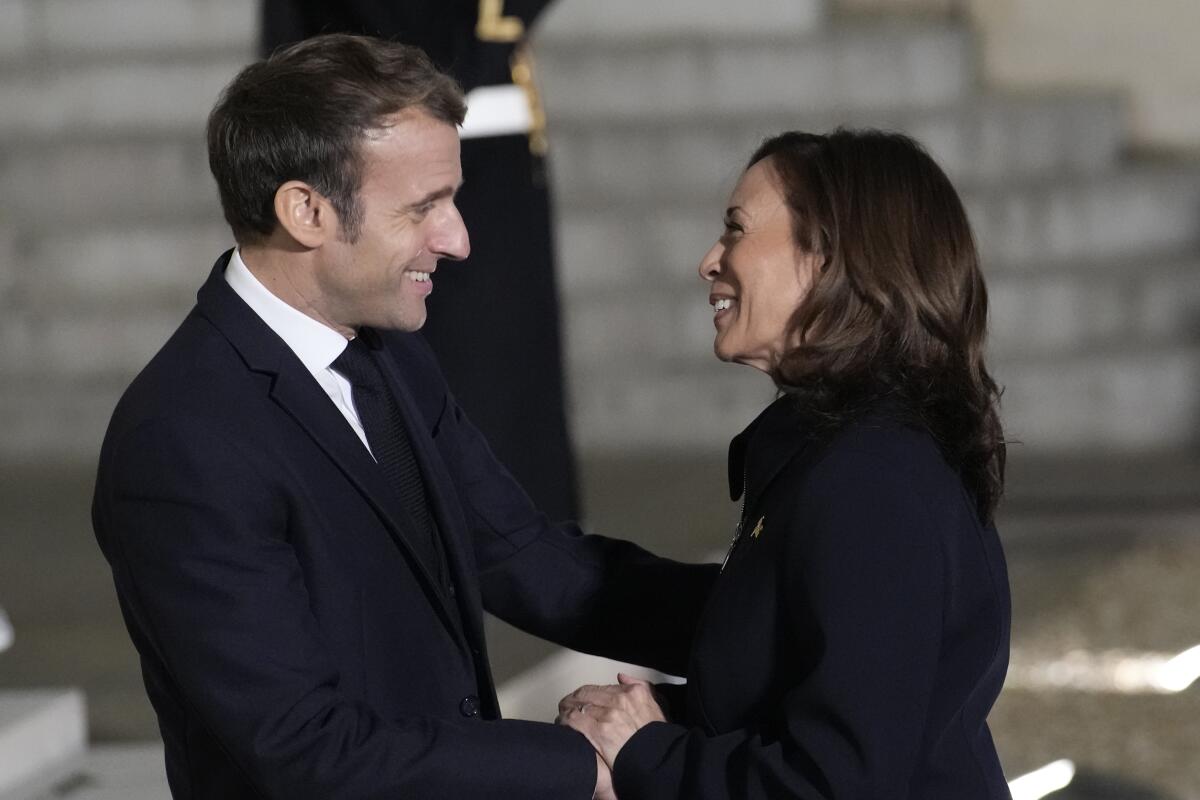Kamala Harris is in Paris making the case that Trump’s ‘America First’ era has ended

PARIS — When President Trump traveled to France for a ceremony marking the 100th anniversary of the end of World War I, he walked alone, shunning European leaders who marched in unity along the Champs-Elysees. He then left town ahead of a peace conference intended to highlight cooperation among democracies.
Three years later, Vice President Kamala Harris, the highest-ranking American to visit France since Trump left office, is trying to make the case the United States is a team player.
She began a five-day trip here by declaring “the best kind of work” happens with “scientists from around the world coming together.” Her tour of the Institut Pasteur science lab Tuesday, where Americans are working alongside Europeans to tackle COVID-19 and where her Indian-born mother researched breast cancer, was one of several events aimed at drawing a contrast with Trump’s “America First” agenda.
On Wednesday evening, she met with French President Emmanuel Macron at the Elysee Palace for nearly two hours. Both leaders told reporters that they agreed it was “the beginning of a new era” that required working together.
“When the United States and France have worked together on challenges and opportunities we have always found great success because of shared values and shared priorities,” Harris told Macron in front of reporters. Neither leader responded to shouted questions.
Harris’ efforts to rebrand America as a collaborator come amid a major rift between the Biden administration and the French government over an arms deal that has yet to fully heal and amid continuing questions about whether America can really be counted on in the long run, despite the administration’s “America is back” motto.
Nicholas Dungan, a senior fellow at the Atlantic Council think tank who focuses on France, said Europeans are eager to have America back.
“The problem,” Dungan added, “is what does it mean?”
Dungan said Europeans’ concerns about U.S. leadership extend more deeply than how Trump handled foreign policy. European allies believe Trump was probably just a brash iteration of longer-term changes in American attitudes about engaging in the world.
Among the indications that the United States is struggling to regain its leadership role, Dungan said, were its chaotic withdrawal from Afghanistan and its uneven attempts to address climate change. The U.S. government’s increasingly aggressive posture with China — a continuation of the Trump administration’s tough line — has also caused angst in European capitals.
“The idea that Trump was a once-in-a-century or once-in-a-lifetime aberration is not something that people believe,” said Dungan, who resides in The Hague.
With the success of Republicans last week in state and local elections and the recent tanking of approval ratings for President Biden and Harris, European and world leaders have new evidence that Biden’s power may be tenuous and that Trump, who continues to issue statements and endorse candidates, remains a force in American politics.
Macron, for example, has raised implicit doubts about America’s role in world affairs. He has argued that Europe should build its own defenses, so that it is not as dependent on American protection.
The Biden administration says it is seeking to address broader concerns about America’s leadership.
An administration official who briefed reporters on Harris’ trip said there was a “common thread” to her meetings here, “exercising American leadership on consequential global challenges and issues.”
In addition to speaking Thursday at the peace forum that Trump skipped in 2018, Harris is joining a conference on the future of Libya that includes 20 world leaders, including German Chancellor Angela Merkel, a co-host, who had notably frosty relations with Trump over his go-it-alone style.
Harris laid a wreath Wednesday at an American war cemetery, and will attend a second ceremony marking Veterans Day with Macron on Thursday.
Thomas Wright, director of the Center for the United States and Europe at the Brooking Institution think tank, said allies appear eager to engage in such meetings with top U.S. officials because they know what to expect — a return to normalcy in international relations after four years of enduring Trump’s “America First” policies.
“They were worried about ‘America First’ deliberately undermining the multilateral order that they really cared about,” he said, calling the differences with Trump “more existential” than those with Biden.
A French official, speaking on condition of anonymity to discuss the still-delicate matter, said Biden has put the U.S. in “the right direction,” by rejoining the Paris climate accord after Trump withdrew and engaging with efforts to distribute vaccines to poorer countries.
But there remain deep challenges and differences. Harris’ trip is largely intended to mend relations with France after the contentious fight over submarine technology.
France briefly withdrew its ambassador to the U.S. in September after the Biden administration struck a secret deal with Australia to build nuclear-powered submarines, blindsiding France. As a result of the U.S. deal, Australia canceled its $65-billion contract to buy French-made submarines.
Biden met with Macron in Rome, just before the climate change summit in Scotland, calling the handling of the agreement “clumsy” as he attempted to mend relations. Harris’ trip is an extension of that effort.
Macron seemed pleased with the meeting but not ebullient.
“Trust is like love,” he said in Rome. “Declarations are good, but proof is better.”
More to Read
Get the L.A. Times Politics newsletter
Deeply reported insights into legislation, politics and policy from Sacramento, Washington and beyond. In your inbox three times per week.
You may occasionally receive promotional content from the Los Angeles Times.











